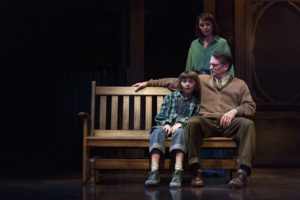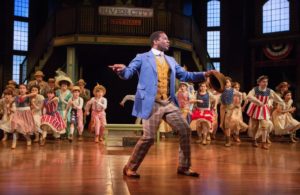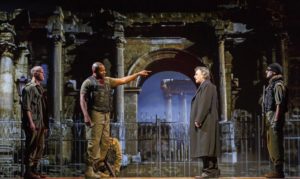VIEWPOINTS – Stratford Festival 2018: An operation in transition, but no less mighty
- By drediman
- August 7, 2018
- No Comments

A view of the famous stage of the Festival Theatre at the Stratford Festival in Ontario, Canada.
I recently concluded my fifth visit to the renowned Stratford Festival in Ontario, Canada (I had previously attended its 2008, 2010, 2012, and 2016 seasons). In short, the current 2018 season exhibited an operation in transition, but no less mighty. Many of the Festival’s more recognizable marquee actors – Christopher Plummer, Brian Dennehy, Brent Carver, Ben Carlson, Geraint Wyn Davies, for instance – weren’t in attendance this season, but several of its grand dames most certainly were. Stratford favorites Lucy Peacock, Seana McKenna, and Martha Henry all stepped up to the plate, often times in unorthodox roles that their male counterparts would have coveted. Additionally, this season also had to manage without the uncomfortable but much-loved Patterson Theatre, which was recently demolished to make way for a new state-of-the-art theater that’s slated to open in 2020 alongside the picturesque Avon River (based on the renderings, the new facility will be a gorgeous addition). This meant that this season could only accommodate 12 productions (of which I saw nine, in five days) instead of the usual 14 – still an astonishing feat for any company, particularly of the near-extinct repertory theater variety. Despite these so-called setbacks, the Stratford Festival, whose efforts focus on the works of Shakespeare and is in my opinion the finest classical theater company in North America, continued to produce its signature brand of thoughtfully curated, truthfully acted, and handsomely mounted theater. Indeed, in this idyllic town, the play’s most certainly the thing.

Irene Poole, Jonathan Goad, and Clara Poppy Kushnir in “To Kill a Mockingbird” at the Festival Theatre.
DAY ONE kicked off my trip with a restrained but deeply affecting stage version of To Kill a Mockingbird (HIGHLY RECOMMENDED) at the Festival Theatre. Here, director Nigel Shawn Williams has opted to use Christopher Sergel’s sturdy, if somewhat unremarkable, 1969 adaptation of Harper Lee’s venerated classic novel. The power of this production arose from the nakedly honest performances Mr. Williams has coaxed from his fine cast, particularly Irene Poole as the adult Scout – the memory play’s achingly searching narrator – and Jonathan Goade’s quietly authoritative Atticus Finch. On the surface, the production may seem excessively subdued, but its deliberate, confident pacing and series of subtle revelations and tableaus had a forceful cumulative impact that unexpectedly crept up on me. This restrained approach to theater-making was also strikingly evident in Miles Potter’s production of Eugene O’Neill’s Long Day’s Journey Into Night (RECOMMENDED) at the Studio Theatre, led by Stratford veterans Seana McKenna and Scott Wentworth as the famously troubled Tyron family matriarch and patriarch. Interestingly, both are working together in another production this season, albeit in a different capacity: Mr. Wentworth also directed Ms. McKenna in the title role (!) in the Festival’s current staging of Julius Caesar. Although this mounting of O’Neill’s searing semi-autobiographical play could have used more heightened directorial flourishes – much of the play does take place in a sort of drug- and booze-fueled “fog”, after all – I was for the most part impressed by the solid, if at times oddly underplayed, acting. Although I was taken by the sensitive work of Charlie Gallant and Gordon S. Miller as the Tyron sons, I had hoped for slightly more pyrotechnics from Ms. McKenna and Mr. Wentworth.

Martha Henry in “The Tempest” at the Festival Theatre.
DAY TWO was comprised of two major productions of Shakespeare plays. In the afternoon, I took in a matinee performance of The Tempest (RECOMMENDED), directed by Stratford Festival artistic director Antoni Cimolino, at the Festival Theatre. In the past, I’ve admired Mr. Cimolino’s straightforward productions, which have put the emphasis on truthfulness in acting over flashy, gimmicky stagings. Although this Tempest is no exception, the play – the Bard’s last – works best when infused with a good dose of exuberant stage magic throughout. Although there were indeed moments of enchantment in this production, I felt a little short-changed, particularly in the mostly uninspired first act. Nevertheless, the main reason to see the show is the opportunity to catch Martha Henry’s Prospero. Ms. Henry, acting in her 44th awesome season at the Festival, is giving a magisterial performance that’s full of grit, wisdom, and grace. The production’s gorgeously moving final sequence – no spoilers here! – more than makes up for the somewhat pedestrian preceding scenes. That evening, I caught Mr. Wentworth’s aforementioned production of Julius Caesar (RECOMMENDED), which on the surface registered defiantly traditional (which is in refreshing contrast to Shakespeare in the Park’s Trump presidency-inspired production last summer at the Delacorte in Central Park). Look a little closer, though, and you’ll see that some of the key roles in this textually male-dominated play are portrayed by women, most notably Michelle Giroux’s beautifully played Marc Antony and Ms. McKenna’s title character. That both unflinchingly excelled in these roles is a marvel. I was especially astonished by Ms. McKenna’s thorough transformation from the previous night’s fluttery Mary Tyrone to the regal Roman emperor.

Daren A. Herbert leads the company of “The Music Man” at the Festival Theatre.
DAY THREE was all about the Festival’s seemingly divergent pair of musical offerings, the American classic The Music Man (HIGHLY RECOMMENDED) at the Festival Theatre and the cult favorite The Rocky Horror Show (RECOMMENDED) at the Avon Theatre. Coincidentally (or perhaps not), each work is the visionary creation of a single man – book, music, and lyrics are by Meredith Wilson and Richard O’Brien, respectively. Both of these productions were also helmed by the same person, Donna Feore, Stratford Festival’s go-to director for musicals. The Music Man, particularly, was exquisitely and insightfully staged. The decision to cast a black man – the charismatic, slippery but amiable Daren A. Herbert – as Harold Hill is fascinating, adding an element of race – and therefore a level of dramatic tension not native to the piece – that worked surprisingly well within the context of the musical. Elements such as the other salesmen’s hostility, the River City mayor’s suspicions, and the chase scene at the show’s climax were all heightened given this color-conscious casting. That’s not to say that the musical’s fun factor was diminished. Quite the opposite; I don’t think I’ve seen The Music Man as jubilantly performed as it was in Ms. Feore’s huge, choreographically dynamic, and ideally cast production (41-person strong!). That evening, I relished the unadulterated, naughty decadence that is The Rocky Horror Show. If anything, seeing both productions back-to-back confirmed for me Ms. Feore’s uncannily firm feel for musical theater. For Rocky Horror, a daring but hugely successful and popular programming choice for this year’s Festival, she’s put together a fast-and-loose staging that stubbornly (thankfully!) refused to shy away from the material’s inherent subversiveness and deviant sexuality. Indeed, seeing the mostly classically-trained Stratford actors let their hair down and “time warp” was a delicious treat into which I gladly sank my teeth. Kudos specifically to Dan Chameroy’s delectable cross-dressing Frank N. Furter, who gleefully ran off with the show, seducing everyone in his path (including the audience).

Graham Abbey, André Sills, Tom McCamus, and Farhang Ghajar “Coriolanus” at the Avon Theatre.
DAY FOUR’s main event, and perhaps the highlight of the Festival season, was Robert Lepage’s production of another of Shakespeare’s (albeit lesser known) Roman tragedies, Coriolanus (HIGHLY RECOMMENDED), at the Avon Theatre. Despite the recent controversy surrounding the auteur director, who is making his Festival debut with this production, his Coriolanus is visionary, cutting-edge theater – traits not typically associated with the Festival’s handsome but usually unfussy stagings. From a technological perspective (projections, sets, sound design), it’s a bold, seamless, and brilliantly-executed stunner from beginning to end. What’s particularly impressive is the focus with which Mr. Lepage has deployed his considerable bag of tricks to subtly sustain tension and mood in what is essentially a staged film. It’s an aesthetic that gives the tragedy a slow-burning inevitability, making for gripping theater that draws you in like a good novel. It didn’t hurt that the acting in the production was top-notch, led by a commanding performance by André Sills as the volatile and conflicted general-cum-senator. As his domineering mother Volumnia, Lucy Peacock gave a deliciously over-the-top performance (the apple doesn’t fall very far from the tree!), one of the most memorable of the season. For its sheer theatrical chutzpah, this Coriolanus is the show not to miss. That evening, also at the Avon Theatre, I attended a performance of Oscar Wilde’s witty and beloved comedy of manners An Ideal Husband (RECOMMENDED). By comparison, the nicely-appointed production, competently directed by Lezlie Wade, seemed tame, creaky even. Nevertheless, after a tentative start, the production gained its footing, especially once the Brad Hodder’s irresistible, charmingly dry Lord Goring started driving the plot with his dandy antics. The rest of the cast, however, was merely serviceable, although they were able to hit all their marks satisfactorily. I left the theater neither elated nor disappointed. Truth be told, I was still chewing on Mr. Lepage’s Coriolanus.

Brigit Wilson and Tom McCamus in “Napoli Millionaria!” at the Avon Theatre.
DAY FIVE, the final day, was a bittersweet one. I only caught one show that day, a matinee performance of the rarely-peformed Napoli Millionaria! (HIGHLY RECOMMENDED) by Eduardo De Filippo – in a world premiere translation by John Murrell commissioned by the Stratford Festival – at the Avon Theatre. The rock solid production was directed by Mr. Cimolino in his usual well-judged manner, its themes transparent without force-feeding the audience. The acting all-around seethed with vitality and feeling (without falling into caricature-land), just right for the emotive Italian characters that populate the play. The wonderfully-etched leading performances by Brigit Wilson and Tom McCamus were notably complex and heartfelt. Mr. De Filippo’s work was emblematic of all the other plays I encountered this season at Stratford – like those others, Napoli Millionaria! made clear that morality in the face of the prospect of power and/or conflict (particularly war), is very rarely black and white. Only by openly exploring and deeply delving into these grey areas can we potentially free ourselves of the invisible chains that keep us captive. Thank you once again, Stratford Festival, for raising a mirror to its audiences, allowing us to contemplate and debate, through a constellation of brilliantly selected and thought-provoking theater, what it means to be human. Until we meet again.
THE STRATFORD FESTIVAL
Regional, Theater (Stratford, Ontario)
In repertory through November 11

 Copyright © 2024
Copyright © 2024
Leave a Reply